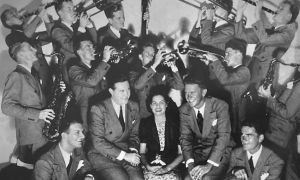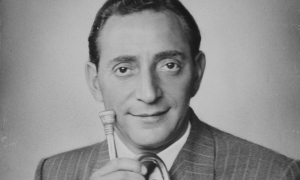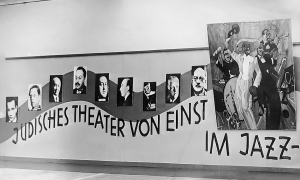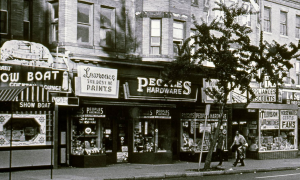Home » Jazz Articles » History of Jazz » The Mysterious Ms. Morel
The Mysterious Ms. Morel
I guess I really don't know how I feel about myself as a singer.
—Terry Morel
Terry Gibbs
vibraphoneb.1924
"The mysterious Ms. Morel." —Michael Steinman, Jazz Lives
All these descriptions fit a singer from Philadelphia whose memory has almost completely faded. It's true, there are some web sites dedicated to following female singers from the 1950s and 1960s who were never quite household names, but with a few exceptions,

Terry Morel
vocals1925 - 2005

Nina Simone
piano and vocals1933 - 2003

Ruth Price
vocalsb.1938

Betty Roche
vocals1920 - 1999

Pearl Bailey
vocals1918 - 1990
Her given name was Florence Cohen. She told Kirk Silsbee, a major source of information about Morel for me, that she was "raised on the streets of Philadelphia." This would have been South Philadelphia and specifically Morris Street, not far from where part of my Mother's family lived. It was working class, Italian and Jewish in the 1930s and 1940s, but safe enough. Cohen's family owned the property and had tenants. I suspect that Florence and my Mother, virtual contemporaries, went to the same elementary school, Furness Public School, and that the Cohens were better off than Florence (Terry) allowed. Florence was obviously bright as well. She went to Girls High while my Mother went to South Philadelphia. At that point, their paths diverged sharply. There is a nice portrait of "Floss" in the 1943 Girls High Yearbook noticing her "lovely voice and cheery smile." Street kid is not what I would have called Florence. Nor my Mother.
By 1946, Florence, now singing as Terry Morel, was on the road. She was with someone called "The Tim Welsh Quartet" who ran through several female vocalists in Troy, New York. Spring of 1947 found her closer to home, singing at Nick's Town Tavern in Delair, New Jersey and Chubby's Cafe in West Collingswood. These were a part of the night club scene just over the bridge from Philadelphia, and they did a lot of their business by evading Pennsylvania's notorious blue laws, statutes that basically made it illegal to have fun on Sundays ("I went to Philadelphia last weekend. It was closed.") New talent, b-list name acts and the occasional established singer showed up at these places. Philly musicians like

Charlie Ventura
saxophone, tenor1916 - 1992
Mary Ann McCall
b.1919
Dave McKenna
piano1930 - 2008
Sonny Igoe
drumsb.1923
She made some New York appearances by then as well, a selling point for publicity in Philadelphia clubs. "New Jazz Singing Favorite of New York" announced the Celebrity Room. She and

Ruth Price
vocalsb.1938

Clifford Brown
trumpetb.1930
Billy Root
saxophone, baritoneb.1934

Miles Davis
trumpet1926 - 1991
If this was Morel's first recording, it was a winner. There are only four tunes on the 45 EP, but they are lovely. "But Not for Me" and "I Remember You" are lovely and her voice simply shines with sincerity. That is really their essence. There are no gimmicks, only Luisi's deft accompaniment to Morel's unadorned voice. I don't know who wrote the lyrics to her version of "I Can't Get Started," but they're not Ira Gershwin's: "I buy from Grandma Moses, but I can't rub noses with you." There's a lot of genuine emotional turmoil here, whatever Morel was going through in her life. Considering that Miles was one of the principal artists in the series, it's no wonder he was surprised to meet her. And it's no wonder that interest in her was growing.
Around 1955, Ms. Morel got another break. She was singing in a club in New York and Bethlehem Records recorded her. This too was no small thing. According to David Edwards and Mike Callahan's Bethlehem Discography, Part 2, the line-up included

Bob Dorough
vocals1923 - 2018

Chris Connor
vocals1927 - 2009

Bobby Troup
piano1918 - 1999

Herb Jeffries
vocals1850 - 2014

Urbie Green
trombone1926 - 2018

Frank Rosolino
trombone1926 - 1978

Stu Williamson
trumpet1933 - 1991

Howard McGhee
trumpet1918 - 1987

Ralph Sharon
piano1923 - 2015

Herbie Mann
flute1930 - 2003
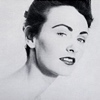
Jane Fielding
vocals
Charles Mingus
bass, acoustic1922 - 1979

Conte Candoli
trumpet1927 - 2001

Stan Levey
drums1925 - 2005
Yet, in late 1955, Morel ended up doing one of Harvey Husten's "Jazz in Jersey" nights in Gloucester City, NJ, with

Miles Davis
trumpet1926 - 1991

Ray Bryant
piano1931 - 2011
The reasons for Morel's departure for the West Coast thus remain a mystery. They may have been largely personal. She was by no means a major star in Philly, but she was making a living in a crowded field—we don't remember today quite how many very good women singers there were in the 1950s—and attracting more notice. A move to Los Angeles in 1957 must have seemed logical at that point. Perhaps it was. At least a move to Laurel Canyon was because Florence Cohen from Philadelphia became Terry Morel, a habitue of the jazz and Bohemian scene there. She lived modestly, in something of a "treehouse" for $60 a month, and hung out with a crowd that, with due respect to South Philly, could have only been found in LA. Lee Wilder,

Larry Bunker
drums1928 - 2005
Joe Maini
saxophone, altob.1930

Cannonball Adderley
saxophone1928 - 1975

June Christy
vocals1925 - 1990

Paul Horn
flute1930 - 2014
This has been amply documented by Kirk Silsbee in Harvey Kuberniks's book, Canyon of Dreams, with a photo of the by-then ravishing Morel with Cannonball as living proof. If ever there was a place for a jazz singer to make a mark, to get to know the right people in the business, this would have been it. Beautiful, talented, witty, you might think it would all come together there. And, for a while, it more or less did. She started gigging around Southern and Central Coast California appearing as "Bethlehem Records Star" (she must have loved that), Terry Morel on one bill with

Bill Perkins
guitar1924 - 2003

Buddy DeFranco
clarinet1923 - 2014
There were bigger things in the works, including television appearances. Terry made two appearances on Bobby Troup's KABC show Stars of Jazz that ran from 1956 through 1958, but as far as anyone knows, the kinescopes have disappeared. Fortunately, the soundtracks of the broadcast March 4, 1957, exist, CAL 3001, Oscar Peterson/Gerald Wiggins, Sessions/Live. It was a Monday night, and not a big day historically. It was, however, a big moment for Morel. Backed by the

Gerald Wiggins
piano1922 - 2008
One of Morel's biggest boosters in LA was the radio personality Frank Evans. In 1962, he hosted a short-lived television show on KTLA called Frankly Jazz. On November 10, 1962, Frank had Terry on, accompanied by

Clare Fischer
piano1928 - 2012

Gary Peacock
bass, acoustic1935 - 2020

Larry Bunker
drums1928 - 2005
She was also on the radio as well as a sort of "underappreciated talent," which was accurate enough, because she was singing out in El Monte for $5 a night, maybe at the Caprice, a well known after hours club. "Talk about being dedicated to your art," Morel wryly observed. She got involved with pianist

Joe Albany
piano1924 - 1988
Morel had come back East and sang at the 1961 " data-original-title="" title="">Newport Jazz Festival All Stars after being invited by

George Wein
piano1925 - 2021

Nancy Wilson
vocals1937 - 2018

Julie London
vocals1926 - 2000
Terry's personal story is, alas, not unfamiliar. I can think of another Philadelphia singer who got off to a quick start: a nice recording contract; airtime, club dates; even major network television appearances. Her personal life, however, went rocky and she turned away from jazz and pop. Then she faded out. Even worse, in some ethnicities—not inevitably, but not infrequently— there was a lingering suspicion that an entertainer, especially a woman, was somehow disreputable. This was true for men as well, not to mention an attractive woman. Ziggy Vines, one of Morel's contemporaries from Philadelphia, as gifted a jazz saxophonist as he was, apparently got no support from his family. Quite the contrary. While I don't know this was true for Morel, I don't know that it wasn't. Morel did tell Kirk Silsbee she missed her parents. Yet she was something of a Bohemian. Morel knew enough to stay away from hometown characters who were bad news, but she had advanced social views for a country just beginning to confront segregation. In jazz, famously, that was—and is—no small thing. There were other subjects darker still. There is no evidence—not a document to be located—that Morel ever had any underground associations, connections that could help make or break an entertainer then. There was talk of her appearing in Las Vegas, but as far as I know, Morel never did. How and if any of these considerations influenced her career is simply impossible to say. Or maybe it was bad luck. In the last analysis, the results were the same. Morel's career as a singer did not prosper.
"Well," she told Kirk Silsbee. "I didn't want to be a middle age jazz singer. Rock 'n Roll was coming in, so I stopped singing. I took a job as a phone solicitor....I had to pay my bills and I didn't have a lot of work experience....I've never been afraid of hard work and I had to eat....I worked at Schwab's drugstore on Sunset from '67 to '70....I worked [at a store called Harold's Place from '75 to '81] on Melrose... We sold used clothes, furniture, and oriental rugs—just beautiful things....and I could sell merchandise like I never knew I could.." Perhaps most revealing of all, "I guess I really don't know how I feel about myself as a singer." This is no place for armchair analysis, but ambivalence marks Morel's time as a singer. Even artists who believe in themselves can find the life tough going.
There was one last recording, and in an amusing way, perhaps her most successful of all. Her close friend Bob Dorough invited her in to sing on Schoolhouse Rock, the long running educational series on ABC. In 1973, Terry was the lead backup on "Conjunction Junction, What's Your Function" with trumpeter

Jack Sheldon
trumpet1931 - 2019
Terry Morel died of cancer in 2005. She was cremated and there is no grave site to visit. I'm sure that's just the way she wanted it. Whatever else she said or thought, her death certificate simply gave her occupation as "Singer." So fitting. Rest in peace, Ms. Morel.
Tags
Comments
PREVIOUS / NEXT
Support All About Jazz
 All About Jazz has been a pillar of jazz since 1995, championing it as an art form and, more importantly, supporting the musicians who make it. Our enduring commitment has made "AAJ" one of the most culturally important websites of its kind, read by hundreds of thousands of fans, musicians and industry figures every month.
All About Jazz has been a pillar of jazz since 1995, championing it as an art form and, more importantly, supporting the musicians who make it. Our enduring commitment has made "AAJ" one of the most culturally important websites of its kind, read by hundreds of thousands of fans, musicians and industry figures every month.








 Buy Now
Buy Now




